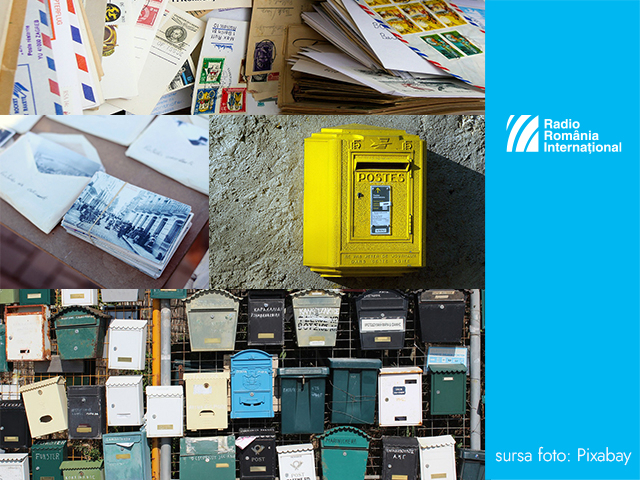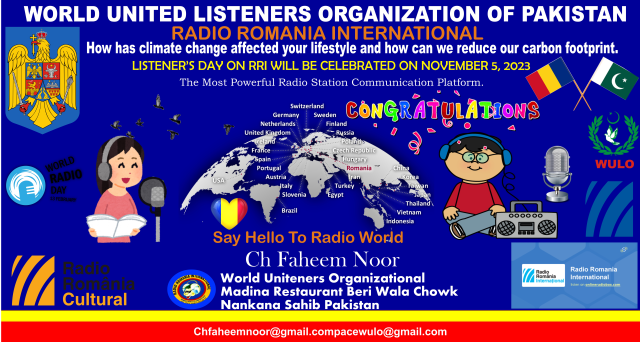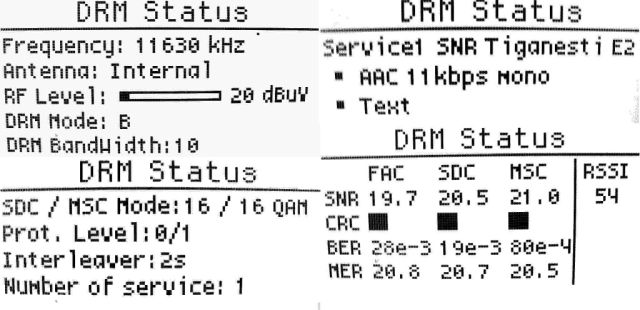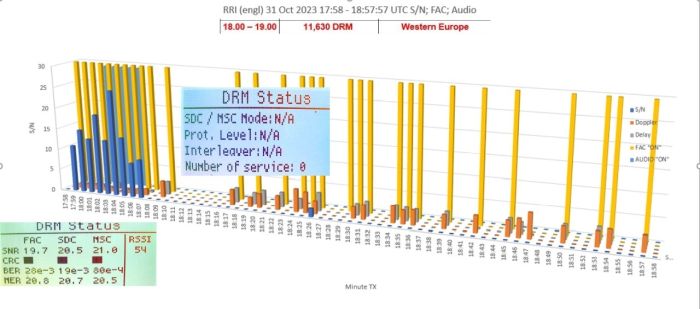Mail Roundup – November 11, 2023
A roundup of messages we've received in the last two weeks

Vlad Palcu, 11.11.2023, 17:44
Hello, friends!
Two weeks have again passed, and
there’s been a lot going on during this time: we’ve switched to regular time
and we had our Listeners’ Day special programme.
We’ve had an overwhelming number
of contributions and messages of congratulations from our listeners, some of
which we’ve added to last week’s follow-up post on Listener’s Day. Below is one
such example, sent by Ch. Faheem
Noor (Pakistan).

Unfortunately, the two
transmitters discontinued in August will most likely remain so until the end of
the year, possibly longer. I know this affects DRM transmission in a number of
areas, an inconvenience for which we apologize.
We also know many of you are
still expecting to receive QSLs this year. As you might have already heard on
the airwaves, our government is taking repeated measures to cut public
spending, which directly impact our institution as a public service provider.
It means a lot of our budget will go to maintenance and repair works for our transmitters,
to keep the broadcasts going, but not much to anything else. Little things such
as QSLs (which we know how much they mean to most of you), are also collateral
‘casualties’.
We do have a piece of good news
for you – we have prepared digital QSLs (eQSLs), and will start sending them to
listeners who’ve sent reception reports over the course of the year!
We got a lot of messages at our
office and at our email address, engl@rri.ro
over the last two weeks, so let’s look at some of the interesting ones.
***
Chris Malboeuf (Canada) wrote to
us sending a number of reports, also enclosing a nice picture of Mount
Arrowsmith overlooking Sproat Lake near Port Albeni, his hometown.

Thanks for the wonderful photo,
Chris. This sure is a view to remember!
***
Of course, we wouldn’t conceive
publishing a roundup without including (at least) one of the letters sent by
our listeners from India, Bidhan Chandra Sanyal. This time Bidhan sent a
message about Halloween, celebrated on the last day of October. Here is what he
wrote:
Halloween means
hallowed evening or holy evening. The word comes from
the Scottish word All Hallow’s Eve. The word eve used
in Scots was shortened or shortened to in. Thus changing over time
Hallow’s Eve
translates to Halloween.
The traditional Halloween
festival is celebrated on October 31 every year. The day is currently celebrated in almost all
countries of the world. But in the
western world, Halloween is celebrated with grandeur. But many may have no idea what this Halloween
actually is!
You will be surprised to know
that the history of this ghostly festival is more than 2000 years old. Many people think that this day may be
celebrated as a ghost. In fact, the day
is observed to commemorate the departed souls.
You will be shocked to know the history of Halloween day!
The word Halloween originated
around 1745. It originated in the
Christian community. The word Halloween’
or ‘Halloween’ comes from the Scottish word ‘All Hallows’ Eve’. The word Halloween means ‘holy evening or
holy evening’.
Over time, the word ‘Hallow’s
Eve’ was transformed into ‘Halloween’.
The main theme of the Halloween festival is ‘to face the power of death
through humor and mockery’.
About 2000 years ago, Celtic
people lived in present day Ireland, England and Northern France. The first day of November was celebrated by
them as New Year or ‘Sah-win’. They
thought it was the end of summer and darkness or the beginning of winter.
Surprisingly, the Celtic nation
believed that the night of the last day of October was the worst. The night that all ghosts and unsatisfied
spirits can harm people. And so members
of the Celtic nation wore various types of ghost masks and clothes on this
night.
They used to go around together
in a circle wearing masks and chanting mantras to pass the sleepless
night. And in the course of time, the
‘Sah-win’ festival of the Celtic nation is currently being celebrated as the
‘Halloween’ festival. There are many
myths about Halloween night.
One such popular myth is that on
this night the god Saman called all the dead souls to earth. A Halloween witch flies across the sky on a
flying broom. Sometimes he knocks on the
doors of different houses.
When did Halloween start?
It is known that the Halloween
festival has been celebrated since the Middle Ages. The Celtic civilization spread across
Ireland, Wales, the Highlands of Scotland and the western part of France. Halloween originated from the ‘Sah Win’
festival celebrated by the ancient Celts.
Halloween became a holiday in
America in the late 1800s. At the turn
of the century, children and adults alike started celebrating Halloween. Various events, sports, seasonal food and
festive clothes were used on this occasion.
Even now, there is no end to the
debate in Europe-America about celebrating Halloween. Preparations go on throughout the month to
celebrate the night. Apart from this,
Halloween is also celebrated in Canada, Ireland, Puerto Rico, Japan, Australia,
and New Zealand in Asia. Even in
Bangladesh Halloween festival is celebrated.
From attending parties in
Halloween costumes to carving pumpkins, wearing masks, scaring, telling ghost
stories, watching horror movies and dressing up, everyone is busy during this
festival.
Thanks, Bidhan, for this message.
Halloween is celebrated in Romania too, not as a national holiday, of course,
but much like everyone else, as a commercial holiday. Occasional costumed
parties are thrown, for instance in large corporations or in some schools and
kindergartens. You do see a lot of decorated carved pumpkins in windows silts,
and many young people flock to shopping malls for themed events or to see the
latest scary movie releases.
***
From Sweden, Christer Brunström sent his regular
monthly report, adding the following:
It has been an extremely busy
period since Sunday when most radio stations amended their schedules and
frequency usages for the winter season. I write a monthly column called World
Radio Listener and in the December edition I will include an international
programme schedule. It is basically a listing of times and frequencies of stations
that can be heard on shortwave here in Sweden. RRI has of course been included
and I list programmes in English, German and French. The schedule starts
at 0500 UTC and ends with the last transmission of RRI at 23.00. Sadly the
number of possible broadcasts is on the decrease and very few stations actually
broadcast to a European audience (RRI being the notable exception). Most
broadcasts are beamed towards Africa. China has the biggest presence on
shortwave today but some of their transmissions only comprise non-stop music
(for reasons completely unknown to me).
Thanks for the update, Christer.
Fortunately, we have been able to extend our SW broadcasts to Europe, and hope
to continue so in the future as well.
***
As you know, in late October we
switched to the B23 broadcasting period, operating a few changes of our own to
our broadcast frequencies. As you can see above, we got a lot of similar
reports from listeners who wrote to give technical feedback on our broadcasts
and operating frequencies. One such message was sent by Karl-Heinz Bradtmoeller:
In my opinion the previous used
frequency 13750 kHz was a little bit better than the 11630 kHz now in use.
And, unfortunately yesterday
occurred an unforeseen power reduction after minute 8 of transmission.
Checked signals both with Gospell
GR-216 and Tecsun S-2000.
The USB-Logging function of the
Gospell GR-216 shows some more details, what could have had happened.
Unfortunately the original DRM
Log software seems to be no more available, that is why I shortened amount of
data and created a new excel file with graph, which took nearly the half day to
do. Hope this will be useful for you. The same transmitter Tiganesti E2 worked
yesterday properly on the following transmission on 7235 kHz, that is why I think
the reason for sudden shut down after minute 8 during the English transmission
could probably be found in antenna mismatch using the new frequency 11630 kHz.
To avoid a damage to the transmitter it was powered up again only with
drastically reduced power providing not a sufficient input signal strength for
decoding on receiver’s site. Only some peaks showed the FAC channel. You can
have a look on the attached files and the logging file diagram.
Hope for better reception
conditions.
Thanks, Karl, for this update. We
obviously let our technical staff know about the possible mismatch. Karl also
sent us the following snapshots, two of the DRM issue he signaled, the other of
his home.


***
Lu Dacheng (China) also sent us a
number of reports for October, also writing to tell us he attended an event in
the Asian Games hosted by Hangzhou:
In October, 2023. I saw the
games of Sepa Takraw in Jinhua Central Arena. It is the part event of 19th
Hangzhou Asian Games. The ticket costs about 12 USD. Sepa Takraw is a good-looking sport. It has
many difficult and acrobatic postions. It is popular in Southeast Asia. The
nickname of Sepa Takraw is Kick Volleyball. The ball is made of rattan trees. I saw the final match of men’s 3 people and
women’s 3 people. The games is 3 Match. Every set is 21 scores. Who gain 2 sets
is winner.
Lu also enclosed a number of
photos, we included a couple of them below.


***
From the Netherlands, Peter
Reuderink sent us a report accompanied by the following message:
I am 61 years old, and live in
Woerden, The Netherlands. Since a year I’m retired and I have plenty of time to
pick up my old radio hobby again. Like in my previous emails I’d like to attach
a nice picture from my home town. Here you can see the Windhond, the flour mill
which stands on the old city bulwark that once surrounded the old medieval town
of Woerden.

Thanks, Peter! Enjoy your
retirement and thanks for tuning in!
***
Wishing a speedy recovery to our
listener from Cyprus, Costa Constantinides, who had a pacemaker installed in
October! We hope you have a full recovery, Costa! Thanks for the report as
well!
***
Our friend from Malaysia, Mohamad
Haidir Hasim, wrote to congratulate us on Romanian Armed Forces Day. Here is
what he writes:
I just find out that 25 October
is Romanian Armed Forces Day (Ziua Armatei).
This date was chosen because on
that day in 1944, the Romanian army finally liberated its territory and loss
around 90,000 men lost their live during great war (according to Romanian
Ministry of National Defence)
I would like to take opportunity
wishing to all Romanian armed forces personnel Happy Armed Forces
Day and may who lost their lives for defending sovereignty and freedom of
Romania will rest in peace.
In Malaysia, we celebrated armed
forces day on 16 September and this year our armed forces reach 90 years old
since 1933.
Radio Romania International also
has a dedicated show for armed forces called The Eastern Flank and
i think is great to appreciate and acknowledge them.
In this recent events and
geopolitical instability, I’m sure the soldiers need support from their own
people.
Finally, I hope no war another
war and conflict that bring more harm than good. Let our children or next
generations live in peace and freedom.
Thank you, Mohamad, for your
comments and for spreading the message of peace.
***
It’s now time to wrap up our
roundup and thank everyone else who took the time to send reports, comments and
suggestions. Our gratitude goes to Malik Allah Bachaya (Pakistan), Siddhartha
Bhattacharjee (India), David White (USA), Tomasz Kotas (Poland), Ding Lu
(China), Guido Panebianco (Italy), Craig Tyson (Australia), Nithin George
(India), Bernard Grondin (Belgium), Glenn Hauser (USA), Richard Langley
(Canada), Kari Tuovinen (Finland), Norihiko Ide (Japan), Carlo Giordani
(Italy), Rafael Gradeja (Mexico), Zhenheng Kang (China), Lu Dacheng (China),
Abdul Mannan (Bangladesh), Rob den Boer (Netherlands), Marc Soens (Belgium),
Vincent Everett (USA), Ricky Hein (USA), Kraig Krist (USA), Harald Süss
(Austria), Lawrence Cohen (USA), Thamminana Krushna Rao (India), Ranjit Darnal
(Nepal), Sal Domino (USA), Jon Collins (UK), Mamun Rashid (Bangladesh), David
Mawby (Finland), Sahadot Hossain (Bangladesh), Muhammad Aqeel Bashir
(Pakistan), James O’Brien (UK), Jayanta Chakrabarty (India), Tomasz Kotas
(Poland), Robin Miller (USA), Denis Kutuzov (Russia), Anand Mohan Bain (India),
Reginaldo Anunciação (Brazil), Fotios Padazopulos (Greece), Gino Simonetti (Italy), Hidemitsu Miyake
(Japan), Abheraj Singh (India), Nazih Mohammed (Morocco), John Jurasek (USA),
Subir Basu (India), Paul Glover (UK), Siddhartha Bhattacharjee (India), Vishal
Rane (India), Haruna Ibrahim (Nigeria), Anwar Hosain (Bangladesh), David
Freeborough (UK), Igor Belevich (Belarus), Hans Verner Lollike (Denmark), Ataur
Rahman Ranju (Bangladesh), Yaara Ahmed (Bangladesh), Takashi Ogasawara (Japan),
Mohan Natarajan (India), Madhab Chandra Sagour (India), Abid Hussain Sajid
(Pakistan), Nasir Aziz (Pakistan), Bruce Lee (Australia), Phil Hayward (UK), Saleem
Akhtar Chadhar (Pakistan).
73!




























